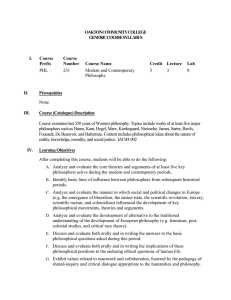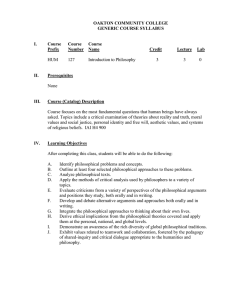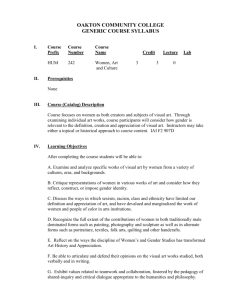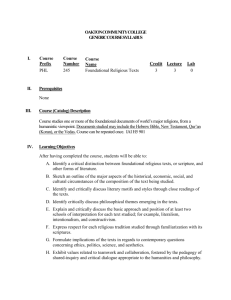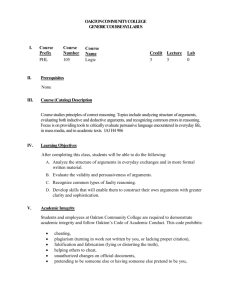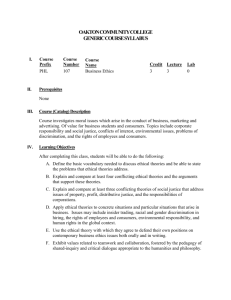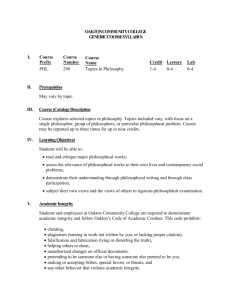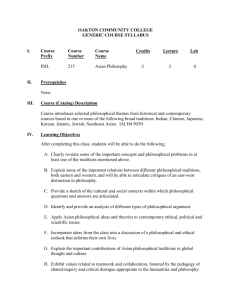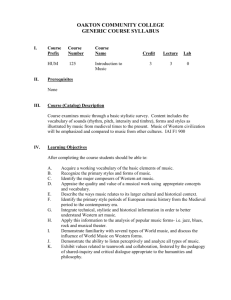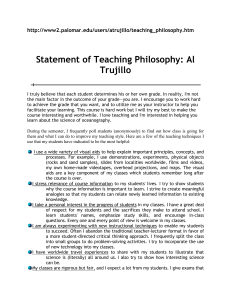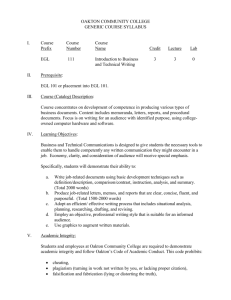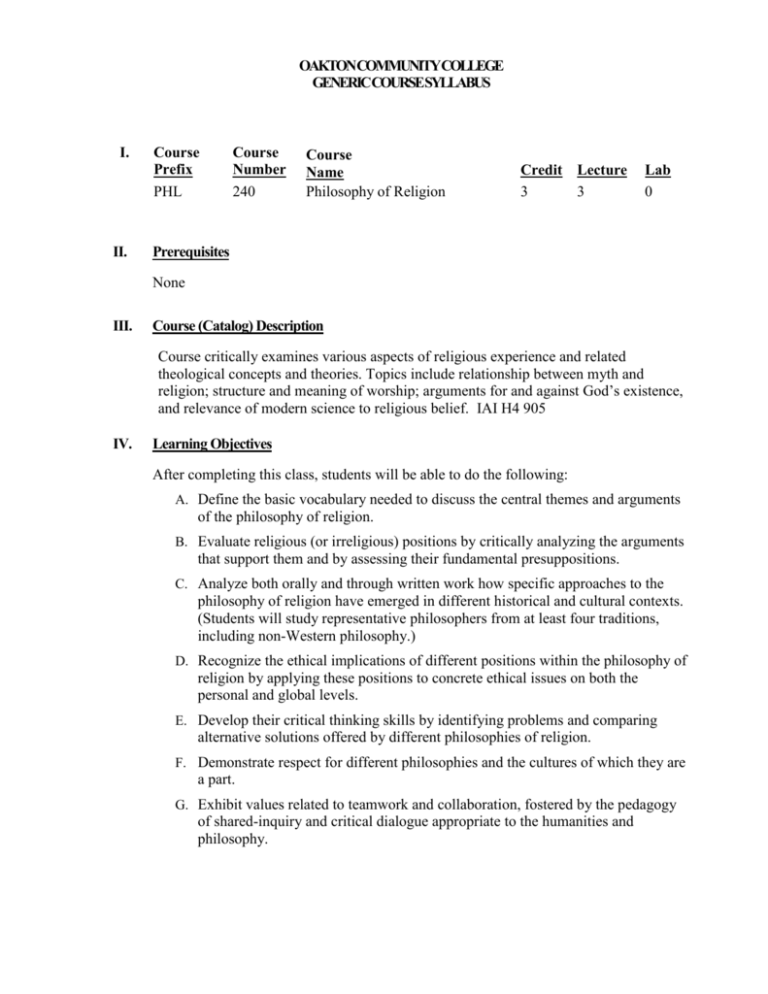
OAKTONCOMMUNITYCOLLEGE
GENERICCOURSESYLLABUS
I.
II.
Course
Prefix
PHL
Course
Number
240
Course
Name
Philosophy of Religion
Credit Lecture
3
3
Lab
0
Prerequisites
None
III.
Course (Catalog) Description
Course critically examines various aspects of religious experience and related
theological concepts and theories. Topics include relationship between myth and
religion; structure and meaning of worship; arguments for and against God’s existence,
and relevance of modern science to religious belief. IAI H4 905
IV.
Learning Objectives
After completing this class, students will be able to do the following:
A. Define the basic vocabulary needed to discuss the central themes and arguments
of the philosophy of religion.
B. Evaluate religious (or irreligious) positions by critically analyzing the arguments
that support them and by assessing their fundamental presuppositions.
C. Analyze both orally and through written work how specific approaches to the
philosophy of religion have emerged in different historical and cultural contexts.
(Students will study representative philosophers from at least four traditions,
including non-Western philosophy.)
D. Recognize the ethical implications of different positions within the philosophy of
religion by applying these positions to concrete ethical issues on both the
personal and global levels.
E. Develop their critical thinking skills by identifying problems and comparing
alternative solutions offered by different philosophies of religion.
F. Demonstrate respect for different philosophies and the cultures of which they are
a part.
G. Exhibit values related to teamwork and collaboration, fostered by the pedagogy
of shared-inquiry and critical dialogue appropriate to the humanities and
philosophy.
COURSE SYLLABUS (GENERIC)
Page 2
PHL 240
V.
Academic Integrity
Students and employees at Oakton Community College are required to demonstrate
academic integrity and follow Oakton’s Code of Academic Conduct. This code
prohibits:
cheating,
plagiarism (turning in work not written by you, or lacking proper citation),
falsification and fabrication (lying or distorting the truth),
helping others to cheat,
unauthorized changes on official documents,
pretending to be someone else or having someone else pretend to be you,
making or accepting bribes, special favors, or threats, and
any other behavior that violates academic integrity.
There are serious consequences to violations of the academic integrity policy. Oakton’s
policies and procedures provide students a fair hearing if a complaint is made against
you. If you are found to have violated the policy, the minimum penalty is failure on the
assignment and, a disciplinary record will be established and kept on file in the office
of the Vice President for Student Affairs for a period of 3 years.
Details of the Code of Academic Conduct can be found in the Student Handbook.
VI.
Outline of Topics
(This is a sample outline of topics. In your outline of topics please specify the dates on
which you will cover specific topics and other important dates such as exams and paper
deadlines.)
I.
II.
III.
New Perspectives on the Philosophy of Religion
A.
Does Religious Thinking have a Foundation? Smith and Nishitani
B.
Philosophy of Religion and Pluralism: Bilamoria
Visions and Skepticism of Ultimate Reality
A.
Non-Theistic-Monism: Lao Tzu and Shankara
B.
Arguments for God’s Existence: Avicenna, Udayana and Aquinas
C.
Religious and Anti-Religious Skepticism: Dharmasiri and Hume
The Problem of Evil in Focus
A.
Western Approaches; Theological and Existential: Mackie and Wiesel
B.
Confucian Debates on Human Nature: Mencius and Hsun Tzu
C.
For and Against Religious Civilization: Confucius and Nietzsche
COURSE SYLLABUS (GENERIC)
Page 3
PHL 240
IV.
Ponderings on the Afterlife
V.
A.
Jewish and Christian Studies in Contrast: Lamm and Maritan
B.
The Theory of Rebirth: Aurobindo
C.
Naturalism and the Denial of Immortality: Badham
The Conflicting Commitments of Faith, Reason, Science and Truth
A.
Motivations for Faith: Averroes and Pascal
B.
A Social Critique of Religious Belief: Marx
C.
Cases for and Against Miracles: Swinburne and Hume
D.
East Asian Perspectives on Science and Religion: Hu Shih and Abe
VII. Methods of Instruction
Course may be taught as a face-to-face, media-based, hybrid, or online course.
VIII.
Lectures and discussion
Small group work
Films
Student presentations and debates
Guest speakers
Field trips may be required
Course Practices Required
(Please include information here about all expectations you have for your students
regarding behavior, work, etc. The following are sample components you may wish to
include. Please be aware that you must require students in this course to produce at
least 15 pages of critical written assignments over the course of the semester. These
may be assigned in a variety of ways including journals, response papers, field trip
projects, etc.)
Essays
Standards for written work
Quizzes/Exams
Attendance
Participation
Final Project
COURSE SYLLABUS (GENERIC)
Page 4
PHL 240
IX.
Special policies about make-up exams, late papers, or other matters of concern
Instructional Materials
Note: Current textbook information for each course and section is available on Oakton’s
Schedule of Classes.
A text such as Gary E. Kessler, Philosophy of Religion: Toward a Global Perspective
might be used.
X.
Methods of Evaluating Student Progress
(In this section, please present the percentages or point breakdown of their final grade.
The writing assignments should count for at least 40% of the final grade. An example
follows.)
XI.
Quizzes/Exams……40 points
Journal/Essays……40 points
Final Project with oral presentation……10 points
Attendance and participation……10 points
Grading scale: 90-100, A……80-89, B……70-79, C……60-69, D
Other Course Information
A. Disabilities
If you have a documented learning, psychological, or physical disability you may be
entitled to reasonable academic accommodations or services. To request
accommodations or services, contact the Access and Disability Resource Center at the Des
Plaines or Skokie campus. All students are expected to fulfill essential course
requirements. The College will not waive any essential skill or requirement of a course
or degree program.
B. Discrimination
The Oakton Community College Catalog states:
Oakton Community College does not discriminate on the basis of race, color, creed,
religion, national origin, disability, age, sex, sexual orientation, or marital status in
admission to and participation in its educational programs, activities and services,
or employment practices. The College does not tolerate sexual harassment or
sexual assault by or of its students or employees.
In keeping with this policy of tolerance and non-discrimination, in this class all of us
(myself included) should strive to listen and give careful consideration to all ideas
expressed in class, especially those that are different from our own, without attacking or
COURSE SYLLABUS (GENERIC)
Page 5
PHL 240
demeaning the people who have those views. We should also strive to avoid using
insulting terms or telling offensive jokes when talking to or about individuals or groups.
C. Instructor information
Office number and office hours:
Phone number:
Email and website:
Approval Dates:
(Faculty: Do not include the following information on your individual syllabi created for class
distribution.)
Effective beginning term:
Fall 2013
Ending term:
Syllabus prepared by: Hollace Graff
Date: March 2006
Revised by:
Date: June 2010
Joo Lee
Reviewed by Chair:
Hollace Graff
Date: July 2010
Approval by Dean:
Linda Korbel
Date
June 2013

